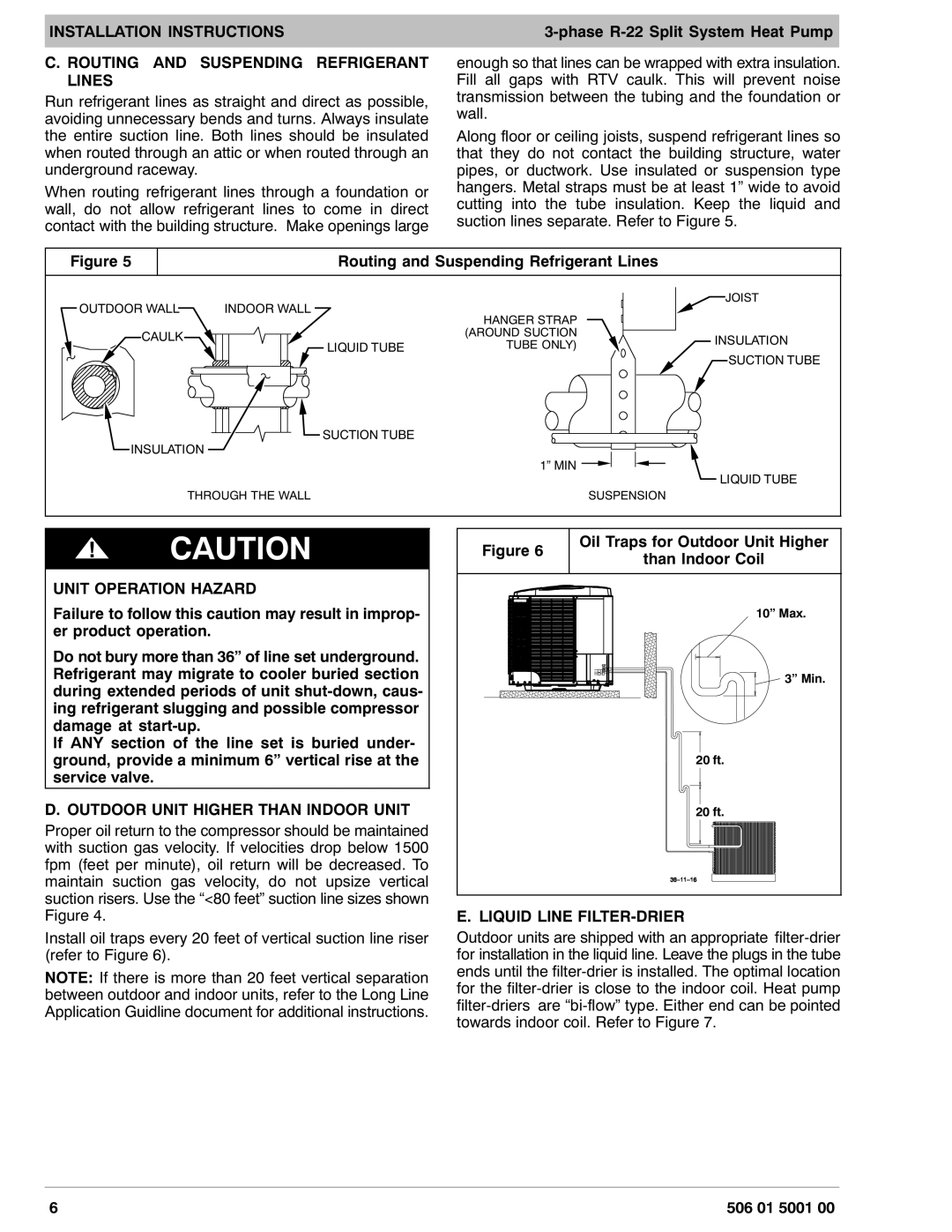
INSTALLATION INSTRUCTIONS
C. ROUTING AND SUSPENDING REFRIGERANT LINES
Run refrigerant lines as straight and direct as possible, avoiding unnecessary bends and turns. Always insulate the entire suction line. Both lines should be insulated when routed through an attic or when routed through an underground raceway.
When routing refrigerant lines through a foundation or wall, do not allow refrigerant lines to come in direct contact with the building structure. Make openings large
enough so that lines can be wrapped with extra insulation. Fill all gaps with RTV caulk. This will prevent noise transmission between the tubing and the foundation or wall.
Along floor or ceiling joists, suspend refrigerant lines so that they do not contact the building structure, water pipes, or ductwork. Use insulated or suspension type hangers. Metal straps must be at least 1” wide to avoid cutting into the tube insulation. Keep the liquid and suction lines separate. Refer to Figure 5.
Figure 5
Routing and Suspending Refrigerant Lines
OUTDOOR WALL | INDOOR WALL | HANGER STRAP | |
|
| ||
CAULK |
| (AROUND SUCTION | |
LIQUID TUBE | TUBE ONLY) | ||
|
SUCTION TUBE
INSULATION
1” MIN ![]()
JOIST
INSULATION SUCTION TUBE
LIQUID TUBE
| THROUGH THE WALL |
| SUSPENSION | |
! | CAUTION | Figure 6 | Oil Traps for Outdoor Unit Higher | |
than Indoor Coil | ||||
UNIT OPERATION HAZARD |
|
| ||
Failure to follow this caution may result in improp‐ |
| 10” Max. | ||
er product operation. |
|
| ||
Do not bury more than 36” of line set underground. |
|
| ||
Refrigerant may migrate to cooler buried section |
| 3” Min. | ||
during extended periods of unit |
|
| ||
ing refrigerant slugging and possible compressor |
|
| ||
damage at |
|
| ||
If ANY section of the line set is buried under‐ |
|
| ||
ground, provide a minimum 6” vertical rise at the |
| 20 ft. | ||
service valve. |
|
|
| |
D. OUTDOOR UNIT HIGHER THAN INDOOR UNIT |
| 20 ft. | ||
Proper oil return to the compressor should be maintained |
|
| ||
with suction gas velocity. If velocities drop below 1500 |
|
| ||
fpm (feet per minute), oil return will be decreased. To |
|
| ||
maintain suction gas velocity, do not upsize vertical |
|
| ||
suction risers. Use the “<80 feet” suction line sizes shown |
|
| ||
Figure 4. |
| E. LIQUID LINE | ||
Install oil traps every 20 feet of vertical suction line riser | Outdoor units are shipped with an appropriate | |||
(refer to Figure 6). | for installation in the liquid line. Leave the plugs in the tube | |||
NOTE: If there is more than 20 feet vertical separation | ends until the | |||
for the | ||||
between outdoor and indoor units, refer to the Long Line | ||||
Application Guidline document for additional instructions. | ||||
towards indoor coil. Refer to Figure 7. | ||||
|
| |||
6 | 506 01 5001 00 |
